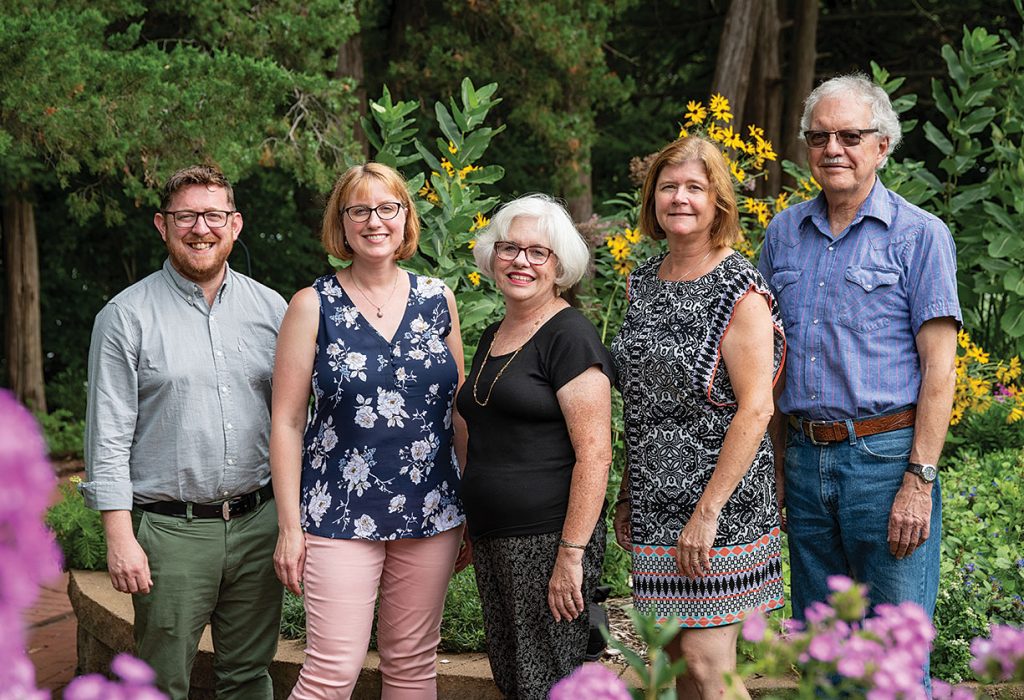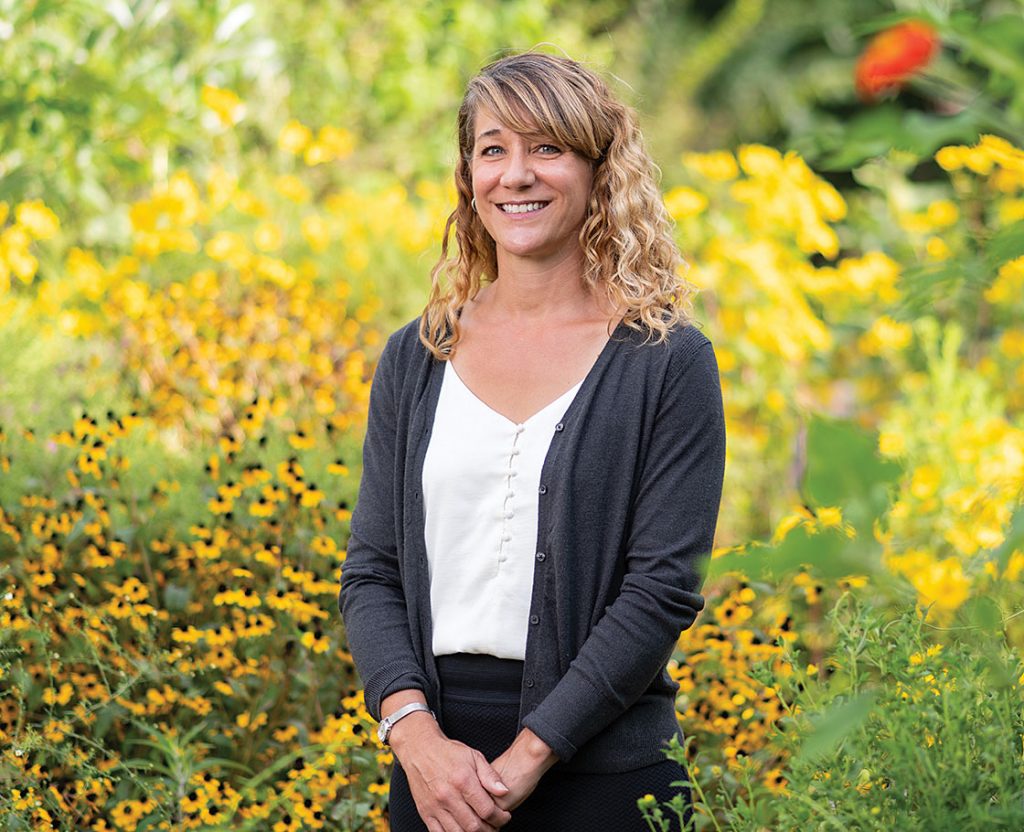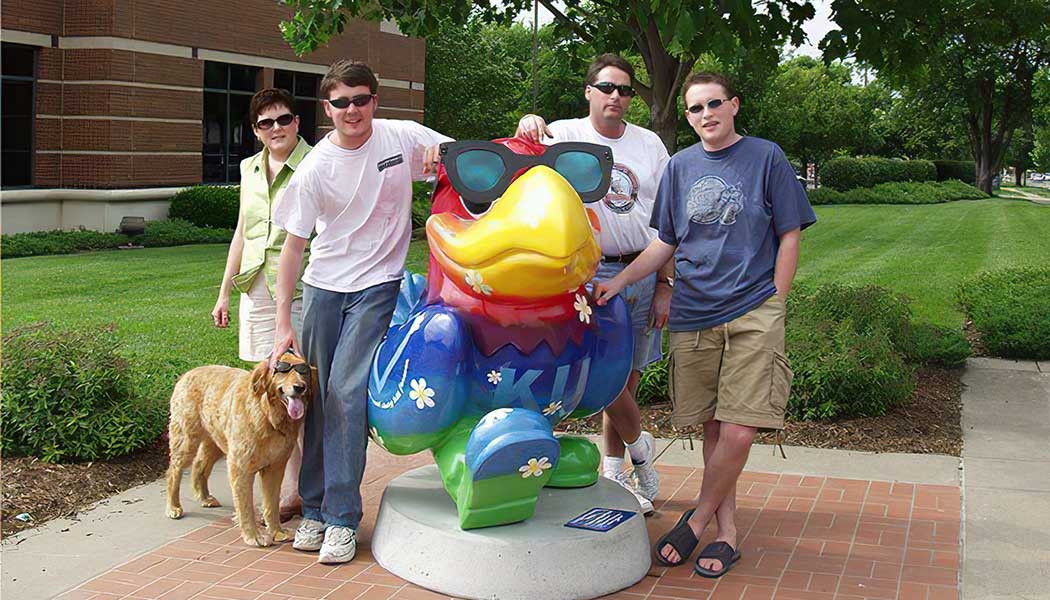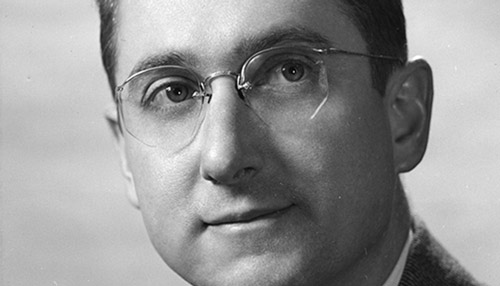Campus briefs
Audio-Reader honored, student claims sports writing prize, Biological Survey undertakes leadership change
KU’s Audio-Reader honored by international group

Among the Audio-Reader staff members and volunteers honored with international awards this summer were Nick Carswell, Jen Nigro, Camille Olcese, Lori Kesinger and Carl Graves. Photograph by Steve Puppe.
Audio-Reader, the reading and information service for blind, visually impaired and print-disabled people across Kansas and western Missouri, won six awards for excellence this summer from the International Association of Audio Information Services.
IAAIS, which represents around 140 reading services in seven countries, presents two categories of awards at its annual conference. Audio-Reader was recognized in both categories.
Program Awards promote quality programming. Co-hosts Melinda and Tom Kearney, d’74, were recognized for “Magazines for the Adult Hour;” Camille Olcese, s’74, won the narrative reading award for “Beauty Will Save the World,” and Jen Nigro, j’97, won the thematic production award for the “Springfield Regional News Promo.” Carl Graves, g’75, won the non-reading entertainment award for researching and hosting “New Year’s in History.” The programs were produced and engineered by Nick Carswell and Joe Penrod, c’19.
Public Affairs Awards honor excellence in member organizations. Graves won the public affairs award for volunteer excellence.
Lori Kesinger, Audio-Reader’s outreach coordinator and listener liaison, won the C. Stanley Potter Lifetime Achievement Award. It is the highest award bestowed by the association.
“We’re honored to receive this recognition from our peers through the international association,” said Beth McKenzie, development director at Audio-Reader. “Our volunteers and staff are amazing, and we’re so happy their hard work and dedication is being recognized. The awards this year show the variety of services we offer that a lot of people might not know about—newspapers, books, and magazines, but also special publications, promotional and advertising materials, local events and historical information, and more.”
The University is in the process of ending its funding for Audio-Reader, which it has supported for nearly 50 years. Starting this fiscal year, KU will reduce its annual appropriation by 50% for each of the next two years before ending it entirely in fiscal 2022. In-kind support, which includes facility space for Audio-Reader’s operation in the Baehr Audio-Reader Center, will continue.
Student earns writing prize for profile of first KU Olympian
For the fourth time in five years, a KU journalism student has won a Jim Murray Memorial Foundation scholarship, the prestigious college writing award that honors the late Pulitzer Prize winning Los Angeles Times sports writer.
Braden Shaw, Shawnee junior in journalism, was honored for a column in the University Daily Kansan on Pete Mehringer, ’34, a wrestler and football player who was the first KU athlete to win an Olympic gold medal.
Shaw’s story recounts Mehringer’s quixotic bid to wrestle for team USA in the 1932 Olympics. After losing in the qualifying finals, he seized a second chance offered by Olympic wrestling coach Hugo Ottopok, losing 17 pounds in 12 days to wrestle at a lower weight class. He won the gold after pinning the 1928 Olympic champion in a preliminary round.
The Murray foundation awards five $5,000 scholarships annually to second- and third-year students, and only one student from each of the top 35 journalism schools can apply. Shaw, the sixth KU student to win, will accept his award at a ceremony Oct. 26 in Los Angeles. Past winners were Christian Hardy, c’18, j’18, in 2017; Scott Chasen, j’17, graduate student in digital content strategy, 2016; Amie Just, j’18, 2015; Mike Vernon, j’14, 2013; and Alyssa Rainbolt, j’11, 2009.
“This was definitely one of the most formative experiences of my short sports writing career,” says Shaw, who is a sports writing intern with the Lawrence Journal-World and is on track to graduate in May 2021 with his journalism degree and a double minor in sport management and film & media studies. “It was a lot of fun. I had a good time and was happy to have won.”
KU’s Audio-Reader honored by international group

The Kansas Biological Survey has a new leader, and Kansas has a new state biologist.
Sara Baer, a Kansas State University graduate who previously served as professor and chair of the department of plant biology at Southern Illinois University, joined KU in August as a professor of ecology and evolutionary biology and director of the Kansas Biological Survey, a West Campus entity that doubles as a KU research center and a state agency. As director, she will also hold the title of state biologist.
Baer succeeds Ed Martinko, PhD’76, who retired after leading the survey for 36 years.
Established in 1911 and formally recognized as an agency in 1959, the survey focuses on natural science research, environmental mapping, conservation and undergraduate and graduate education. Among the facilities it manages is the 3,700-acre KU Field Station, which includes remnants of native prairie and old-growth forests.
Baer’s scholarly focus is on grassland, soil and restoration ecology, and much of her research on restored prairies has been conducted at the Konza Prairie Biological Station managed by K-State, where she earned her PhD in 2001.
RELATED ARTICLES
/








